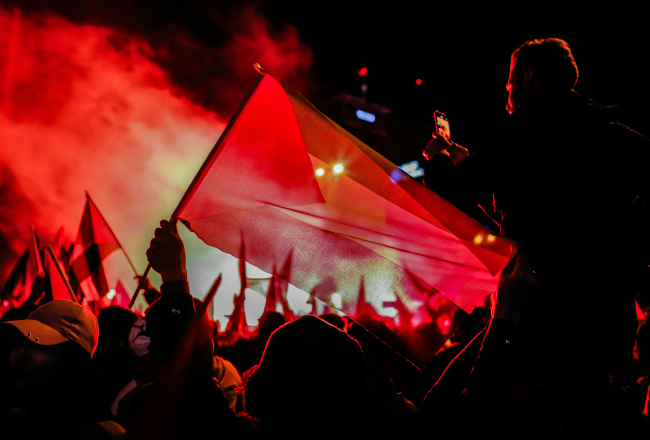
Ilustratīvs attēls/Pexels.com
Pētnieks Leonardo Pataccini aicina Baltijas valstis skatīties uz situāciju Gazā ar tādu pašu līdzjūtību un atbildību kā uz karu Ukrainā. Viņš uzsver, ka Eiropas rīcībai jābūt konsekventai, lai aizsargātu arī pašu reģiona nākotni.
Publicējam redakcionāli nekoriģētu autora viedokli oriģinālvalodā (angļu):
Why Gaza is crucial for Latvia, and the Baltics
I was born in Argentina, but I have been living in the Baltics for over a decade. This is enough time to understand why the Ukrainian cause and fate are so close to the hearts of people in Latvia, Estonia, and Lithuania, and rightly so. Inevitably, the dramatic images from Ukraine rekindle painful wounds that still take a long time to heal in the Baltic countries. Instead, quite often I find myself startled to see that the situation in Gaza tends to be neglected and even tacitly accepted by people, the media and politicians in these countries. I understand that Ukraine feels too close and Gaza too far away to establish the same emotional connection. However, I find many reasons why I believe the cause of Gaza should also be close to the Baltic hearts. Moreover, I think it is very important for the people in the Baltics to see that the future of Gaza is at least as important to their countries as the future of Ukraine.
In essence, what the Palestinians are demanding is a free and sovereign state. This is exactly the same as what Latvians, Estonians and Lithuanians, among many other nationalities, fought for during four and a half decades of Soviet Occupation. In turn, the images of starving Gazan children in overcrowded spaces seem all too bitterly familiar to those who know the history of deportations to Siberia during the Soviet era. Additionally, it's very important to emphasise that the Hamas government in the Gaza Strip since 2007 is a dictatorship, of which the Gazans are not accomplices but victims. Therefore, accusing all the inhabitants of Gaza of supporting Hamas and punishing them for that would be like accusing and punishing all the people living in Latvia, Estonia or Lithuania during the Soviet regime for being communists.
To be clear, the October 7 attacks were a cowardly, heinous, and utterly unjustifiable act perpetrated by a terrorist group that deserves the strongest condemnation and the full weight of international law. Unfortunately, the evidence shows that the ongoing genocide in Gaza has nothing to do with bringing the October 7 perpetrators to justice. The main proof of this is that, according to the most reliable estimates, nearly 70% of those killed in Gaza are women and children.[1] Furthermore, Netanyahu's destructive drive is so indiscriminate that it has even gone so far as to murder several of the Israeli hostages he claimed to want to rescue.[2] Thus, the Netanyahu government's actions in Gaza are not about justice but to erase the identity, the culture and the very existence of the Palestinian society in Gaza. Doesn't this sound all too familiar to residents of the Baltic countries?
Most criticisms of Israel's actions are immediately dismissed by its authorities and allies as "anti-Semitic." This is a banal and Manichean use of the term, as well as an incorrect one. Of course, it is undeniable that, regrettably, many anti-Semitic groups have taken the opportunity to express their nefarious prejudices openly and freely. However, criticism of Israel's actions goes far beyond anti-Semitism. The greatest example of this is the criticism these actions have received within Israel itself from Jewish organizations and individuals. This week, two Israeli human rights groups presented reports calling their country's actions genocide.[3] Furthermore, one of the main groups that has spoken out against Israel's military actions in Gaza has been Holocaust survivors.[4] Is anyone going to accuse these groups of being anti-Semitic or anti-Jewish? The criticism of Israel's actions is not about religion, but about the impunity of an increasingly autocratic government that believes it has the prerogative to decide on the lives and deaths of people across the border. Isn't this the same thing Putin is doing in Ukraine?
In this scenario, the EU and its member states have been playing an extremely shameful and dangerous game. So far, unlike what has happened with Russia, they have not imposed any sanctions on Israel for its actions and crimes. Now, if Israel manages to get away with the plan of destroying and occupying the Gaza Strip without the EU preventing it, what moral authority does it have to oppose Russia doing the same in Ukraine, or anywhere else? What, in my opinion, many people, the media, and politicians in the Baltic countries fail to see is that Israel's success in its plans could send the message that this is permissible and can be done with impunity. This is the worst possible scenario for the future of the Baltic countries. This notion would expose them to a risk that seemed part of the past but could dramatically return if clear and decisive actions are not implemented immediately. Furthermore, it is worth remembering that there are more than 190 countries in the world. For most of them, Ukraine feels as far away as Gaza feels for the Baltic countries. Thus, if the Baltic countries and the EU want to count on the necessary support from the international community for a just cause, such as achieving peace and preserving the territorial integrity of Ukraine, they must show consistency in their actions. Condemning and halting the genocide taking place in Gaza is essential to engaging other countries to stop the ongoing tragedy in Ukraine and holding Russia accountable before international law. European authorities, including those in the Baltic States, have already allowed far more time than is humanitarianly acceptable to act, and although the lost and broken lives cannot be recovered, they must act as soon as possible, because their own future may depend on it.
[1] https://www.bbc.com/news/articles/cn5wel11pgdo.
[2] https://www.bbc.com/news/world-middle-east-67738111.
[3] https://edition.cnn.com/2025/07/28/middleeast/israeli-human-rights-group-accuses-israel-genocide-gaza-intl
[4] https://www.middleeasteye.net/news/yom-hashoah-holocaust-survivors-against-gaza-war-say-never-again-anyone.
Autors ir pētnieks un lektors Latvijas Universitātē un Trinitijas koledžā Dublinā.